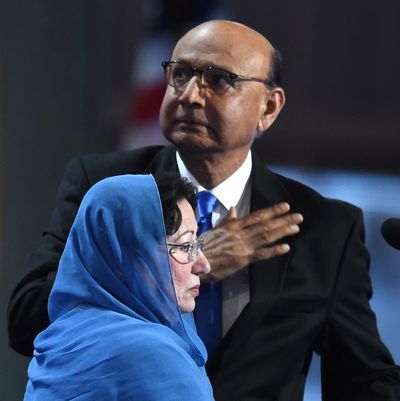
Republican presidential nominee Donald Trump has responded to the devastating rebuke he received Thursday night at the Democratic National Convention from Khizr Khan, the Pakistani-American father of a Muslim U.S. Army captain who was killed in the Iraq War. Responding in an ABC News interview to Khan’s central charge — that the regularly Islamophobic candidate has “sacrificed nothing and no one” in contrast with people like the Khans and their son — Trump insisted, “I think I’ve made a lot of sacrifices. I work very, very hard.” In the interview, Trump also pushed two demonstrably false interpretations: when he called into question whether Khan had written the speech himself, and when he suggested that Khan’s wife hadn’t spoken because she wasn’t allowed to due to their Muslim faith.
In the interview, conducted by This Week host George Stephanopoulos, a defensive Trump seems largely dismissive of Khan’s speech, suggesting that Khan “was very emotional and probably looked like a nice guy” but might not have even written the speech himself, wondering aloud about the sacrifice line: “Who wrote that? Did Hillary’s scriptwriters write it?”
No, they didn’t, according to Khan. Per the New York Times:
The [Clinton] campaign asked whether he needed speechwriting help or any coaching. “I said: ‘I really don’t, I have my thoughts in my head,’” he said. “‘I won’t make it an hourlong speech, just let me say what I want to say. It will be heart-to-heart.’”
Nothing from the speech, he said, was the product of the campaign, including his dig at Mr. Trump’s lack of military service. It all flowed pretty easily, because he had been thinking about these things for quite a while, he said.
In addition to doubting the provenance of the speech, Trump also suggested, quite reprehensibly, that Khan’s wife was prevented from speaking because of their Muslim faith. “If you look at his wife, she was standing there,” Trump remarked. “She had nothing to say. She probably, maybe she wasn’t allowed to have anything to say. You tell me. Plenty of people have written that.” Trump made a similar remark when giving an interview to the Times’ Maureen Dowd, responding to Khan’s speech by simply saying, “I’d like to hear his wife say something.”
Khan’s wife, Ghazala, in fact had plenty to say during a heartbreaking interview on MSNBC on Friday, including how she could barely compose herself during the convention appearance because she is so overcome with grief whenever she sees her son’s photograph, which was displayed on a massive screen behind the Khans on Thursday night. Mr. Khan also said in his own interview that Ghazala had helped him write the speech, and that it was only by borrowing her strength that he was able to speak so publicly on the subject at all.
Their son, Captain Humayun Khan, died in 2004 while serving in Iraq — sacrificing his life to protect his fellow soldiers, as well as nearby Iraqi civilians, when he moved, alone, to confront a vehicle driven by two suicide bombers near the gate to his base in Baqubah, Iraq.
Lastly, regarding Trump’s self-professed sacrifices, the nominee referred to his (regularly questioned) charity work on behalf of veterans and, quizzically, how successful he has been able to become:
I think I’ve made a lot of sacrifices. I work very, very hard. I’ve created thousands and thousands of jobs, tens of thousands of jobs, built great structures. I’ve had tremendous success. I think I’ve done a lot.
Asked by Stephanopoulos if those could really be considered sacrifices, Trump said, “Oh, sure,” before again citing the fact that he was an employer who paid his employees as some kind of proof.
Here’s part of the Trump interview:
And below is the emotional interview that the Khans gave to MSNBC’s Lawrence O’Donnell on Friday, which is worth watching in full — especially Ghazala’s recounting of the conversation she had with her son before he left for Iraq, during which she asked him not to be a hero:
He told me, “Mom, I have a responsibility that I cannot deny. I have to be taking care of my soldiers, because they depend on me.” But still I was keep telling him, “Be safe, and don’t become hero for me. Just be my son. Come back as a son …” He came back a hero.






























